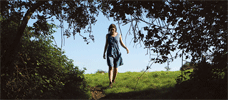Reviews
Alejandro Fernández Almendras
Chile / France, 2009
Credits
Review by Mike D’Angelo
Posted on 11 September 2009
Source 35mm print
Categories The 2009 Toronto International Film Festival
Movies in which absolutely nothing happens are a tricky proposition, and first-time Chilean director Alejandro Fernández Almendras pulls it off with more low-key aplomb than most in Huacho, the only film in Cannes’ little-attended Critics’ Week section to also be selected for Toronto. In fact, for those who’ve grown weary of the uselessly convoluted jigsaw-puzzle films that have been in vogue for the past decade or so, Huacho’s stubborn simplicity may act as a tonic, even if the absence of high (or even low) drama also ultimately makes the experience as a whole feel a touch too slight.
In a rural area outside of Chillán, the capital of Chile’s Ñuble Province, a household of four groggily awakens at the crack of dawn, preparing for what I initially took to be fairly generic Adventures in Picturesque Destitution. Middle-aged single mom Alejandra has to all but drag her pre-teen son, Manuel, out of bed—clearly a daily ritual. They sit down for breakfast with Alejandra’s elderly parents, Cornelio and Clemira, but bread has scarcely been buttered before the power abruptly goes out. Alejandra insists that she’s paid the electric bill; Manuel, trotting outside to check, declares that it’s not the fuse. And at this moment, as if in solidarity with the lack of illumination, the screen itself goes black.
What follows is at once utterly mundane and surprisingly engrossing. Jumping forward in time by perhaps no more than half an hour or so - we know it’s the same day because the power is still out - Huacho proceeds to follow Clemira about her quotidian business, quietly observing as she travels to a nearby farm to purchase milk (the price has gone up), returns home to make squarish hunks of cheese, and then hitches a ride to a busier road where she and various other older women peddle their wares to passing motorists, sometimes engaging in their own covert price wars. At no time does any of this activity appear to be “going anywhere,” in terms of a narrative, but Fernández Almendras holds your interest via fascinating, precisely limned details: the placement of a towel on the floor near the refrigerator (lest things melt during the outage); the numerous steps involved in cheesemaking; Clemira’s friendly banter with her roadside rivals, who are also evidently her closest friends.
At the end of this sequence, which lasts perhaps 20 minutes, the screen goes black again, and we jump back to that morning’s breakfast, shortly after the power goes out. But rather than construct some dumbass series of heavily freighted coincidences and unexpected connections, in the manner of hack Mexican screenwriter Guillermo Arriaga (Babel, The Burning Plain), Fernández Almendras simply starts the movie over, this time following Alejandro to her menial job and on her mission to pay the electric bill, which involves getting a refund for the only nice dress she owns. A third sequence observes Manuel as he spends most of the school day trying in vain to persuade a wealthier classmate to lend him his PSP, and a fourth - as one would now expect - focuses on Cornelio, cutting wood in the fields.
On the one hand, it’s truly refreshing that no real crises emerge from this ordinary day, and that Huacho (the title can apparently mean either “bastard” or “abandoned”) refuses to indulge in the cutesy hey-here’s-that-same-moment-again-from-another-angle! tricks that achronological films often like to play. On the other hand, though, that same integrity means that the ending can’t help but inspire something of a shrug, since it’s not as if we were unaware that some people are poor and that life for those people amounts to a daily struggle. Fernández Almendras has assembled a solid non-professional cast (all of the actors have the same names as their characters), and he demonstrates enough formal dexterity to keep you involved, but he’s also talented enough that you wish he’d tackled something a little meatier.
More The 2009 Toronto International Film Festival
-

Huacho
2009 -

A Serious Man
2009 -

Hadewijch
2009 -

Soul Kitchen
2009 -

The Bad Lieutenant: Port of Call New Orleans
2009 -

The Art of the Steal
2009 -

The Ape
2009 -

Trash Humpers
2009 -

My Son, My Son, What Have Ye Done
2009 -

L’Enfer de Henri-Georges Clouzot
2009 -

Father of My Children
2009 -

Police, Adjective
2009 -

Lebanon
2009 -

Chloe
2009 -

The Disappearance of Alice Creed
2009 -

Lourdes
2009 -

Ondine
2009 -

Life During Wartime
2009
We don’t do comments anymore, but you may contact us here or find us on Twitter or Facebook.



